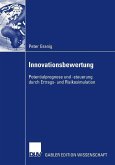In theory and practice, cross-functional teams (CFTs) are considered an essential requirement for the success of innovation projects. However, empirical research indicates that the use of CFTs does not automatically lead to successful innovation. It appears favorable that the - ployment of CFTs has to be directed as systematically as well as other organizational actions. Against this background, this dissertation deals with the phase-specific influence of organi- tional and environmental variables for the success of cross-functional innovation projects. New territory is entered by applying a phase-specific perspective. After having outlaid a th- retical framework, the effects of different variables on the success of cross-functional inno- tion projects during the early and the late project stage are empirically investigated. At its core, the purpose of this study is related to the investigation of the intentional and phase-specific use of organizational infrastructures in order to increase the success of inno- tion projects. Thereby, a difference is made between the early and the late project stage. The intentional manipulation of different organizational and environmental variables may become a more complicated venture, if these structures impede and/ or foster creative processes, in- vation and efficiency at the same time.
Bitte wählen Sie Ihr Anliegen aus.
Rechnungen
Retourenschein anfordern
Bestellstatus
Storno








